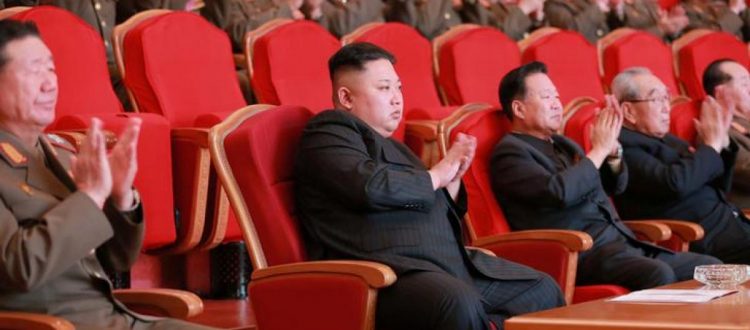Increased Korean tensions – time for concerted non-governmental efforts
Today there is a need for a coming together of non-governmental organizations who are primarily focused on the resolution of armed conflicts such as the International Crisis Group, International Alert, and the Association of World Citizens with those groups concerned with the abolition of nuclear weapons.
| Suggested Reading | Conflict Background | GCCT |
By Rene Wadlow
An escalation of verbal exchanges between the Presidents of the USA and North Korea, missile flights over Japan, US war planes close to the sea frontier of North Korea – one can hardly think of additional ways that governments can increase tensions short of an armed attack which probably all governments want to avoid. But there are always dangers of events slipping out of control. The Security Council of the U.N. has voted to tighten economic sanctions on North Korea. However, to date, sanctions have diminished the socio-economic conditions of the majority without modifying government policy.
For the moment, we look in vain for enlightened governmental leadership. The appeals for calm by the Chinese authorities have not been followed by specific proposals for actions to decrease tensions.
The one positive sign which may help to change the political atmosphere both for governmental negotiations and also for Track II (non-governmental) discussions is the large number of States which have signed the Treaty on the Prohibition of Nuclear Weapons on 20 September, the first day that the Treaty was open for signature. Signature is the first step in the process of ratification. As a light in the darkness, the Holy Sea (the Vatican) both signed and ratified the Treaty at the same time. Guyana and Thailand also signed and ratified the Treaty, the three first ratifications of the 50 needed for the Treaty to come into force.
The Vatican leads by moral example; its Swiss Guard army is only lightly armed. The Holy Sea, although a State, is a bridge to the world of non-governmental organizations. The torch of action must now be taken up by a wider range of organizations than those, which had been in the lead for the abolition of nuclear weapons. The strength of “one-issue” NGOs is that its message is clear. This was seen in the earlier efforts to ban a single category of weapons: land mines, chemical weapons, cluster munitions and the long-running efforts on nuclear weapons.
Some of us have long worked on the abolition of nuclear weapons. I recall as a university student in the early 1950s, I would cross Albert Einstein who liked to walk from his office to his home. I would say “Good evening, Professor Einstein”, and he would reply “Good evening, young man”. I knew that he had developed some theories, which I did not understand but that were somehow related to atomic energy. I was happy that we were both against atomic bombs under the slogan “One World or None!”
The current Treaty on the Prohibition of Nuclear Weapons did not grow from the usual arms control negotiations, such as the Treaty on the Non-Proliferation of Nuclear Weapons or the chemical weapons ban, both of which were negotiated in Geneva, both over a 10 year period. The Nuclear Weapon ban was largely negotiated elsewhere, Vienna and New York, in the humanitarian law tradition of banning weapons that cause unnecessary suffering, such as the ban on napalm after its wide use in the Vietnam War. The contribution of both “ban-the-bomb” groups and the humanitarian organizations such as the International Committee of the Red Cross was great in reaching the successful outcome.
Thus, today, there is a need for a coming together of non-governmental organizations who are primarily focused on the resolution of armed conflicts such as the International Crisis Group, International Alert, and the Association of World Citizens with those groups concerned with the abolition of nuclear weapons. The current Korean tensions are based on the development of nuclear weapons and missile systems and the pressures and threats to prevent their development.
One proposal which seems to me to be a common ground on which many could cooperate has been called a “double-freeze” – a freeze on North Korea’s nuclear-weapon and missile programs with a reciprocal freeze on the yearly US-South Korea war exercises and a progressive reduction of US troops stationed in South Korea and elsewhere in Asia, especially Japan.
There are also proposals for economic cooperation, greater meetings among separated family members, and cultural exchanges. However, given the heat of the current saber rattling, the “double-freeze” proposal seems to be the one that addresses most directly the security situation. We need to build on this common ground.
Rene Wadlow is President and a Representative to the United Nations, Geneva of the Association of World Citizens.
The views expressed in this article do not necessarily reflect the views of TransConflict.



















